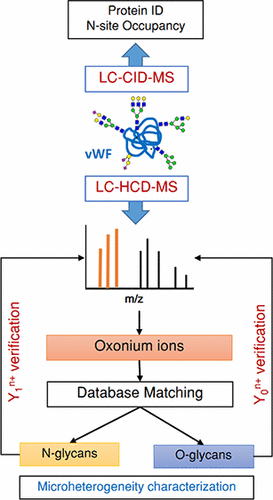Glycosylation Sites and Glycoform Analysis Services
Protein glycosylation not only influences the protein's spatial configuration, biological activity, transportation, and localization, but also plays a crucial role in specific biological processes such as molecular recognition, cell communication, and signal transduction. Therefore, the analysis of glycosylation sites and their glycoforms is of great significance.
MtoZ Biolabs offers a glycosylation site and glycoform analysis service based on LC-MS/MS. We typically start by selecting various enzymes to digest the target protein to cover as much of the protein sequence as possible. After cleaving the glycans by enzymes, the glycosylation sites in the protein are analyzed. Once the glycosylated peptides are identified, the target protein is redigested and the glycans on the peptides are retained. During LC-MS/MS analysis, we use a combination of ETD, HCD, and CID to obtain as much secondary fragmentation information of the peptides as possible. Through software analysis and manual identification of the secondary spectra of glycosylated peptide fragments, accurate information about the glycosylation sites and their glycoforms of the target protein is obtained.

Gashash, E. A. et al. J Proteome Res. 2017.
Figure 1. Glycosylation Sites and Glycoform Analysis Process
Services at MtoZ Biolabs
1. N-Glycan Modification and Site Analysis Service
2. O-Glycan Modification and Site Analysis Service
Service Advantages
1. Accurate Analysis of the Glycoforms Corresponding to the Glycosylation Sites in the Target Protein
2. High Sensitivity and Good Reproducibility
Applications
1. Biopharmaceuticals: Ensures glycosylation consistency in drugs, enhancing stability and efficacy.
2. Disease Diagnostics: Identifies disease-related biomarkers through abnormal glycosylation analysis.
3. Protein Function Research: Reveals the regulatory role of glycosylation on protein structure and function.
4. Vaccine Development: Optimizes glycosylation of vaccine antigens to enhance immune response effectiveness.
5. Food Science and Bioengineering: Studies the impact of glycosylation on enzyme and protein function to improve product quality.
Sample Submission Requirements

Figure 2. Glycosylation Sites and Glycoform Analysis Sample Requirements
1. If you provide tissue samples, please transport on dry ice.
2. If you provide protein samples, please transport protein extracted from common tissues and cell lysis buffer.
3. For optimal sample transport, use plenty of dry ice and choose the fastest mailing method to minimize degradation.
Deliverables
1. Experimental Procedures
2. Mass Spectrometric Parameters
3. Identification information for protein N-type and O-type glycoforms
4. Mass Spectrometric Images
5. Raw Data
MtoZ Biolabs, an integrated chromatography and mass spectrometry (MS) services provider.
Related Services
N-Glycan Modification and Site Analysis Service
How to order?







